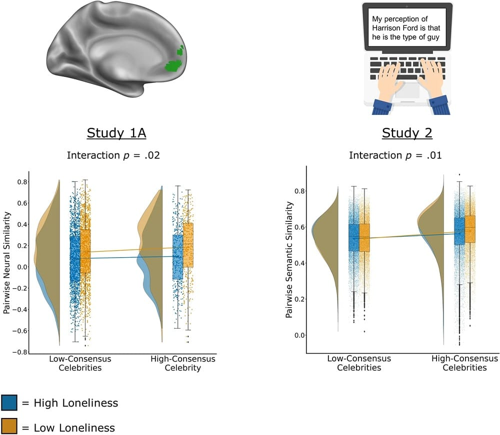A common trait was discovered among lonely individuals.
Many contemporary studies focus on the topic of loneliness. For instance, one recent study demonstrated that marital status and life satisfaction can be predicted based on personality type, while another revealed that social isolation can affect health more significantly than obesity and alcohol consumption.
Experts from Columbia and Stanford Universities (both located in the USA) proposed that if friends and romantic partners react similarly to the same stimuli, then "loners" think and perceive differently than most of the people around them. The results of two experiments that confirmed this hypothesis were published in the scientific journal Communications Psychology.
In the first study, the authors analyzed functional magnetic resonance imaging (fMRI) data from two groups totaling 80 individuals (average age — 20-21 years). While the participants underwent fMRI, they were asked to assess their own qualities as well as those of close friends, acquaintances, and five celebrities: singer Justin Bieber, TV host Ellen DeGeneres, blogger Kim Kardashian, former U.S. President Barack Obama, and businessman Mark Zuckerberg. Additionally, the researchers measured how lonely each participant felt and which members of the group were close to one another.
The findings indicated that lonely participants had a different perception of celebrities and possibly think in unique ways overall. This conclusion was supported by data on brain activity: individuals with a larger number of social connections and those who were close to one another exhibited similar neuronal behavior to some extent. In contrast, the brain activity of "loners" was distinct from that of the rest of the group.
In the second study, 923 employees from Amazon Mechanical Turk (average age — 40 years) participated in an online survey. This survey included assessments of loneliness and questions about celebrities. Initially, participants indicated which of the listed celebrities they had heard of. They were then asked to describe one of the "familiar" celebrities as they would to a friend.

The researchers calculated the degree of semantic similarity between all possible pairs of descriptions provided by respondents. The texts belonging to lonelier individuals were the least similar to the responses of other participants. Moreover, "loners" often reported that their perception of a particular celebrity was either inaccurate or not shared by those around them.
“A shared reality strengthens social connections among individuals and enhances confidence in one’s knowledge, as it is validated by others. <…> In our study, loneliness corresponded to peculiar [unusual, unique] representations of celebrities, as well as more distinctive descriptions, particularly when there was a strong consensus among less lonely individuals. The feeling of lonely individuals that their ideas are not shared by others objectively reflects at least the perception of contemporary culture, which diverges from the mainstream,” the researchers concluded.